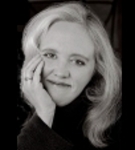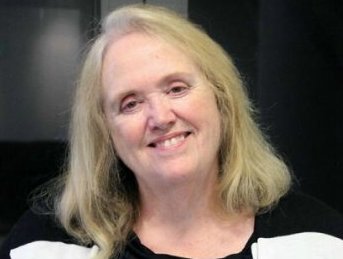
BIOGRAPHY
In Brief

Diane Lake’s film Frida opened the Venice Film Festival in 2002, was named one of the 10 Best Films of 2002 by numerous top 10 lists, including the National Board of Review, and won American Film Institute’s Film of the Year. Frida was also nominated for six Academy Awards, winning two. Script Magazine commissioned this article on the writing of the screenplay.
Diane has been commissioned to write films for Columbia, Disney, Miramax and Paramount, and her television credits include a mini-series for NBC and a half-hour series for ABC. Most recently, her script Hemingway in Paris has been purchased by Fairlink International and filming is expected to take place in Paris and Budapest. She also adapted Thomas H. Cook’s novel Instruments of Night for producer Tony Greenburg. In addition, her short fiction has appeared in the Grey Sparrow Review.
Diane is also sought out around the world as a speaker on film, writing and art. To book Diane as a speaker, email mg@michelgriffin.com
.In Her Own Words - The Whole Story

Growing up in Iowa, my only dream was to find a way to get the *&!!# out. My parents had both left school in junior high, my mother proudly stated she hadn’t read a book since they made her in the 7th grade...so I didn’t have a family that valued education or reading - nor travel as we only left the state to drive an hour to get to Minnesota for the fishing. And given that I hated to fish, I spent those two weeks every summer reading. And then, of course, there were always the movies. I’d spend my babysitting money going to the movies every Saturday afternoon. It was through the books I read and the movies I saw that I realized there was a world out there beyond Iowa and it had immeasurable riches to offer.
I got scholarships to college - in Iowa - but I spent every summer working in New York City where I discovered those riches first hand. Oh, I didn’t have any money, but with Shakespeare in the Park and numerous cultural events virtually free, I was definitely on a Manhattan high. Finally, I moved to Amherst, Massachusetts where I got an M.A. - but was it in writing or film? Hardly - my emphasis was 18th Century Rhetorical Theory...for which there is a real call in the world!
But Amherst wasn’t far from New York and I spent many a weekend there and somewhere, in the back of my mind, I began toying with the idea of writing. What? Hadn’t I been secretly writing missives that I squirreled away in a trunk or something? Nope. And why? Well, I think it was just too big a dream - little Diane Lake from Sioux City, Iowa thinking she could be a writer? Who does she think she is, Hemingway or something?
Or something.... I tentatively wrote a play - which I entered in a contest at the Eugene O’Neill Theatre Center in Connecticut. And although I didn’t win, I received a letter from artistic director Lloyd Richards complimenting me on my play and asking to see more of my work. Well, he had seen it - that one play. But then, when I started to get letters from repertory companies all over the US asking to see my plays - the O’Neill Center had put me on a list of promising playwrights - I began to think. Maybe...just possibly...I could actually be a writer.
While I loved theatre, I realized that you can’t make a living in this country as a playwright - you had to be a professor or something as well. Having always been an avid movie fan, I decided to head to Hollywood and write there.
I was so clueless about what it took to write for film or television. I’d never seen what a script even looked like! But in 1990 I bought an old car, loaded it up with my stuff, and headed out to the promised land...not knowing a soul. I was so naïve that I thought you had to write for TV before they let you write for film. So I bought a TV script, then a movie script - studied their formats - and began to write.
Eventually I met other wanna-be writers like myself, formed a writers' group, and wrote script after script - all of which I carried around in the trunk of my car in case somebody wanted to read one. After a year I got an agent and after three and a half years I made a sale. And so, in 1993, I did it. I was a writer.
As I began to get writing assignments from the studios, my friends joked that they all seemed to involve travel to France. This was actually true. I don’t think I wrote a script for years that didn’t involve a research trip to France. Since I’d fallen in love with the country and its people, I was deliriously happy.
If you’d asked me what the common thread was in my work, I would have told you I didn’t have a clue. It wasn’t until an Australian journalist, while interviewing me, pointed out that I seemed to write stories about a lot of writers and artists that I began to take note of the trajectory of my own career - I was drawn to stories of the creative process.
From Frida to Picasso to Monet, I’ve been fascinated with the mind and soul it takes to create art. And from Raymond Chandler to Ada Byron Lovelace to Edna St. Vincent Millay to Ernest Hemingway, I’ve been equally fascinated with people who can create worlds out of words on paper. And, as producer David Heyman once pointed out to me, whether I’m writing a period piece or a contemporary film, I’m always writing a love story.
Love and art - the passion involved in both - that’s what I try to capture on the page. It’s that push of the artist to create that fascinates me. People who, usually against immeasurable odds, strive to create art or literature tackle something that has very little chance of success...but for those who do succeed, they share with the world their unique vision - and change the world in the process.
It’s all about what it means to be alive - and for me, that means telling stories that inspire and delight, stories about the passions that, on some level, drive us all.

